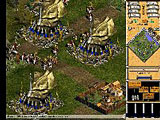 Upon
loading up Seven Kingdoms II: The Fryhtan Wars--and not having played the first Seven
Kingdoms--I promptly said to myself, "great, another RTS for middle management
types." Not a terrific first impression in my book. So I grudgingly launched into the
tutorial missions and after a while, I’ll admit a rather long while, I found myself
starting to enjoy the more mundane tasks that are an integral part of this game: kingdom
management, trade, diplomacy--and particularly political backstabbing. Don’t get me
wrong; this game has plenty of killing and looting and besieging, but it took me a while
to learn the delicate balance between warfare and other social matters. Now I’m a
convert; Trevor Chan and Enlight Software have put together one heck of a game that has so
many facets that it’s initially daunting.
Upon
loading up Seven Kingdoms II: The Fryhtan Wars--and not having played the first Seven
Kingdoms--I promptly said to myself, "great, another RTS for middle management
types." Not a terrific first impression in my book. So I grudgingly launched into the
tutorial missions and after a while, I’ll admit a rather long while, I found myself
starting to enjoy the more mundane tasks that are an integral part of this game: kingdom
management, trade, diplomacy--and particularly political backstabbing. Don’t get me
wrong; this game has plenty of killing and looting and besieging, but it took me a while
to learn the delicate balance between warfare and other social matters. Now I’m a
convert; Trevor Chan and Enlight Software have put together one heck of a game that has so
many facets that it’s initially daunting.Seven Kingdoms II is a game of conquest
where the player doesn’t have to rely on military domination to win, as
financial and diplomatic mastery can lead to success in many scenarios. Most of the
time, your route to conquest is up to you. That’s why this game is considerably more
complex than Age of Empires or any of the other contenders in this year’s deluge of
RTS’s. It’s still an empire-building game, but with unusual depth and enough
unique twists and to distinguish itself from the rest of the pack.
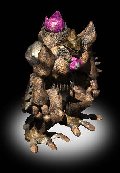 You can choose to play any one
of twelve human races or one of seven Fryhtan strains. The strategies of the humans and
Fryhtan’s are very dissimilar. For example, human players must constantly worry
about pampering their soldiers and civilians or mass defections will ensue. You are
also severely penalized for killing civilians; in contrast, the Fryhtans can gain favor
for the slaughter of the friendly populace. Fryhtans get all-important life-points,
which are needed to breed more warriors, whereas humans can only recruit from exhaustible
supplies in friendly towns. These differences balance out quite nicely. There are also
differences between each human and Frythan race. Each has special attributes that makes
them useful for particular strategies. You can, however, play one race and control towns
and heroes of another race, thus gaining their special attributes, units, and buildings
for your use. You can also form diplomatic alliances with other races and join
forces in defeating the Fryhtans, only later betraying your allies and rustling all their
good stuff.
You can choose to play any one
of twelve human races or one of seven Fryhtan strains. The strategies of the humans and
Fryhtan’s are very dissimilar. For example, human players must constantly worry
about pampering their soldiers and civilians or mass defections will ensue. You are
also severely penalized for killing civilians; in contrast, the Fryhtans can gain favor
for the slaughter of the friendly populace. Fryhtans get all-important life-points,
which are needed to breed more warriors, whereas humans can only recruit from exhaustible
supplies in friendly towns. These differences balance out quite nicely. There are also
differences between each human and Frythan race. Each has special attributes that makes
them useful for particular strategies. You can, however, play one race and control towns
and heroes of another race, thus gaining their special attributes, units, and buildings
for your use. You can also form diplomatic alliances with other races and join
forces in defeating the Fryhtans, only later betraying your allies and rustling all their
good stuff.
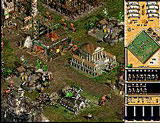 What would any fantasy game be
without heros? Here’s one of the most unique features of Seven Kingdoms II;
Chan and gang have rifled the history books to assemble the biggest and baddest posse of
antiquity’s thugs–forty-five in all. To list the whole batch would be fun, but
let's just note a few of the highlights: from the Greeks we get Alexander the Great and
Jason, the Chinese have the literate Sun Tsu, the Romans have poor old Julius Caesar, the
Japanese have Minamoto, the Vikings have Ragnar Lothbrok and the appropriately named Svein
Forkbeard, the Mongols front with Ghengis and Khubalai Khan, and the Carthaginians have
Hannibal-you can even acquire an Elephant Training Center and have a lot of fun taking him
on a long, long march. Plus you get races and heroes from the Celts, Normans, Egyptians,
Persians, and Indians.
What would any fantasy game be
without heros? Here’s one of the most unique features of Seven Kingdoms II;
Chan and gang have rifled the history books to assemble the biggest and baddest posse of
antiquity’s thugs–forty-five in all. To list the whole batch would be fun, but
let's just note a few of the highlights: from the Greeks we get Alexander the Great and
Jason, the Chinese have the literate Sun Tsu, the Romans have poor old Julius Caesar, the
Japanese have Minamoto, the Vikings have Ragnar Lothbrok and the appropriately named Svein
Forkbeard, the Mongols front with Ghengis and Khubalai Khan, and the Carthaginians have
Hannibal-you can even acquire an Elephant Training Center and have a lot of fun taking him
on a long, long march. Plus you get races and heroes from the Celts, Normans, Egyptians,
Persians, and Indians.
Building is important, and the Tower of Science is one of the key structures that you
need in your arsenal. There you can research new technology and strategies, gaining
advantage over your foes. Also, there are special buildings specific to each race: The
Chinese have a Shao Lin Temple, the Japanese have a Ninja Dojo, the Celts have a Sacred
Grove and so on. On top of all that war factories can provide catapults, ballistas,
cannons, spitfires and such. Everything a good fight needs.
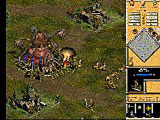 One of the game's real
highlights is its spies-either soldiers or civilians-who can really go out and stick a rod
in your enemies’ clockwork. They can steal stuff, like information and technology
that you could not have gained in any other way. They can also sow dissent among your
enemy’s troops, counterspy, bribe, and assassinate. You also need to train leaders
for your troops--otherwise they are virtually useless. Formations are also integrated into
the game that allow you to attack whilst protecting your leaders and heroes.
One of the game's real
highlights is its spies-either soldiers or civilians-who can really go out and stick a rod
in your enemies’ clockwork. They can steal stuff, like information and technology
that you could not have gained in any other way. They can also sow dissent among your
enemy’s troops, counterspy, bribe, and assassinate. You also need to train leaders
for your troops--otherwise they are virtually useless. Formations are also integrated into
the game that allow you to attack whilst protecting your leaders and heroes.
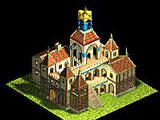 Using the hotkeys is to be
necessary if you want to keep up with the game, which ticks along at lightning pace. At
first this frustrated me a great deal; I had only just checked out my setup and a couple
of years had passed. But given the context of the game it makes sense, providing some
realism in a world where ninjas, Vikings and some really ugly monsters are duke it out
near an ancient Egyptian cityscape. After all, Frythan warriors can’t really have a
gestation period of fifteen seconds, can they?
Using the hotkeys is to be
necessary if you want to keep up with the game, which ticks along at lightning pace. At
first this frustrated me a great deal; I had only just checked out my setup and a couple
of years had passed. But given the context of the game it makes sense, providing some
realism in a world where ninjas, Vikings and some really ugly monsters are duke it out
near an ancient Egyptian cityscape. After all, Frythan warriors can’t really have a
gestation period of fifteen seconds, can they?
The graphics, though unimpressive outside of the RTS genre, are at the forefront of the
forty-five-degree-angle-top-down standard so familiar in these games. The lowest
resolution is 800x600 so everything looks good, and the effects are way better than par.
To keep the game manageable for beginners there are also plenty of options for setting
up stand-alone scenarios. You can even turn off many of the more distressing proceedings
that make the game so difficult to start. For someone like myself, who never played the
first Seven Kingdoms, jumping right into the campaigns is certain and quick death. I
highly recommend taking the time to finish all of the tutorials before getting cocky.
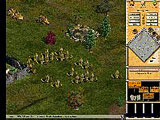 In conclusion--and I haven't
even started to scrape the surface of what Seven Kingdoms II offers--this game sets a
standard for complexity and originality in the RTS world. It boasts an amazing mix of
history and mythology, distilling them into fast and furious strategy gamplay that
doesn’t necessarily rely on military maneuvering. Yeah, the learning curve is rather
steep, but once you get there you will be duly rewarded with a dynamic and more than
mildly amusing gaming experience. Where else can you beat up on the Greeks with Shao Lin
Monks and a guy named Forkbeard? Give it a try, and don’t get upset if you loose the
first few rounds-in no time you’ll be backstabbing Julius Caesar. As if he
didn’t get enough the first time.
In conclusion--and I haven't
even started to scrape the surface of what Seven Kingdoms II offers--this game sets a
standard for complexity and originality in the RTS world. It boasts an amazing mix of
history and mythology, distilling them into fast and furious strategy gamplay that
doesn’t necessarily rely on military maneuvering. Yeah, the learning curve is rather
steep, but once you get there you will be duly rewarded with a dynamic and more than
mildly amusing gaming experience. Where else can you beat up on the Greeks with Shao Lin
Monks and a guy named Forkbeard? Give it a try, and don’t get upset if you loose the
first few rounds-in no time you’ll be backstabbing Julius Caesar. As if he
didn’t get enough the first time.
--Thomas Hoff

 Upon
loading up Seven Kingdoms II: The Fryhtan Wars--and not having played the first Seven
Kingdoms--I promptly said to myself, "great, another RTS for middle management
types." Not a terrific first impression in my book. So I grudgingly launched into the
tutorial missions and after a while, I’ll admit a rather long while, I found myself
starting to enjoy the more mundane tasks that are an integral part of this game: kingdom
management, trade, diplomacy--and particularly political backstabbing. Don’t get me
wrong; this game has plenty of killing and looting and besieging, but it took me a while
to learn the delicate balance between warfare and other social matters. Now I’m a
convert; Trevor Chan and Enlight Software have put together one heck of a game that has so
many facets that it’s initially daunting.
Upon
loading up Seven Kingdoms II: The Fryhtan Wars--and not having played the first Seven
Kingdoms--I promptly said to myself, "great, another RTS for middle management
types." Not a terrific first impression in my book. So I grudgingly launched into the
tutorial missions and after a while, I’ll admit a rather long while, I found myself
starting to enjoy the more mundane tasks that are an integral part of this game: kingdom
management, trade, diplomacy--and particularly political backstabbing. Don’t get me
wrong; this game has plenty of killing and looting and besieging, but it took me a while
to learn the delicate balance between warfare and other social matters. Now I’m a
convert; Trevor Chan and Enlight Software have put together one heck of a game that has so
many facets that it’s initially daunting.